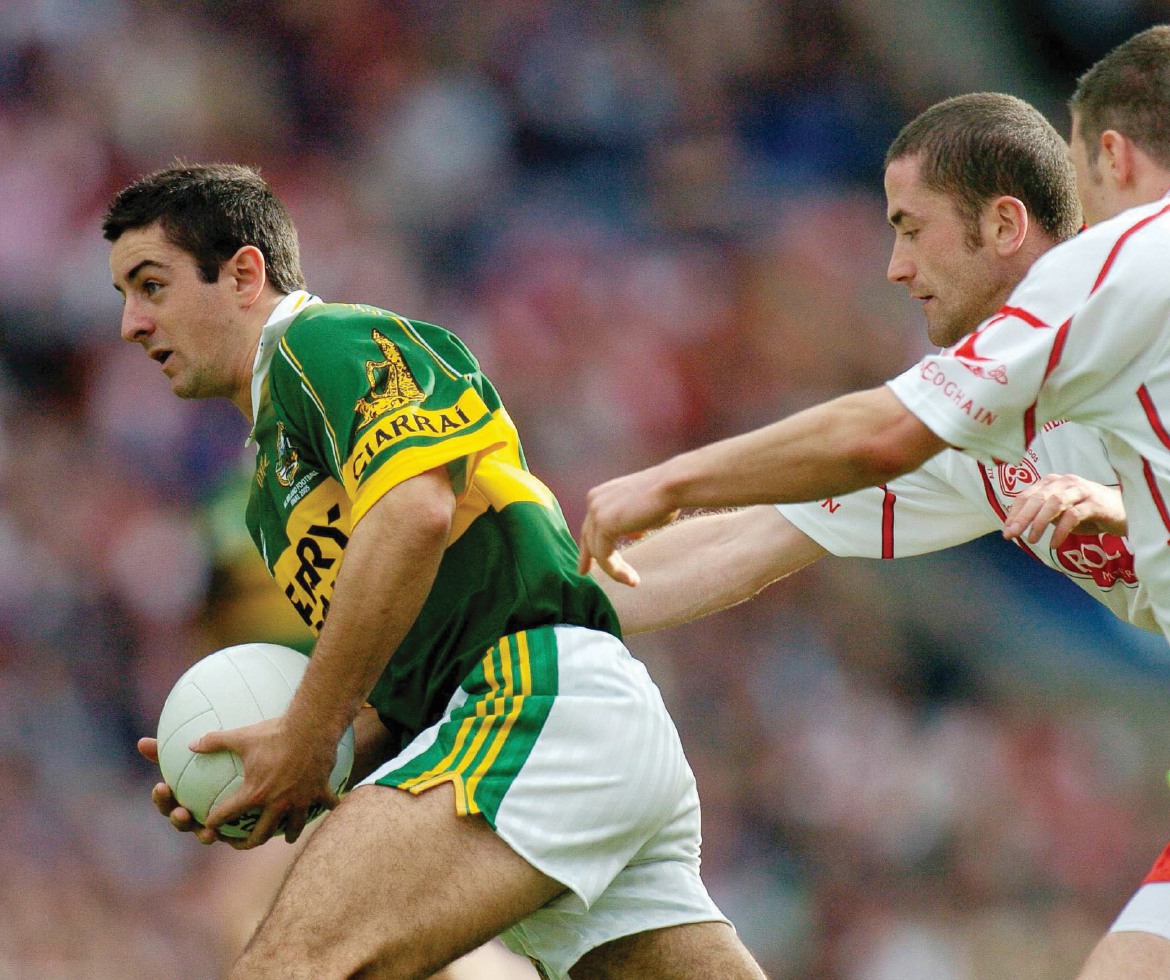Aidan O’Mahony played 155 times for Kerry, was twice and All-Star, won 10 Munster and five All-Ireland titles, was Man of the Match in the 2006 All-Ireland Final. He recalls his battles with Ulster teams, talks tactics, and the road to winning Sam in 2014 and gives his take on the changing face of football.
“I’M going to get up those steps in the Hogan stand in Croke Park for you, Dad, before I finish up.”
By Michael McMullan
THOSE words, from Aidan O’Mahony’s book, Unbroken, come the day after his father Thade’s funeral.
Stepping out of the dressing room in Fitzgerald Stadium, he surveys the empty pitch where Mike Frank Russell’s 1-6 tally tormented O’Mahony’s Rathmore in the Kerry Senior Championship quarter-final. Laune Rangers’ two-point lead spiralled into a hammering by a dozen points.
O’Mahony’s season was over. With just his thoughts for company, he vows to get his hands on Sam Maguire once more, for a fifth time – in memory of his father.
Eight weeks earlier Colm McFadden’s goal ended Kerry’s All-Ireland ambitions as Donegal strode towards a second title.
By the time All-Ireland Sunday came, O’Mahony was in Croke Park watching on as Michael Murphy hammered home an early goal and stood on the Hogan stand steps with the Irish sport’s most cherished silver in his clutches.
O’Mahony’s phone rang on the train on the way south. It was his father, for an analysis of the afternoon’s events with the youngest of their seven children. That was their last conversation, delving over the intricacies of Michael Murphy’s goal.
That was Sunday evening. His father passed away suddenly the next day and by the following weekend O’Mahony had a new mission installed, one he kept to himself.
Adversity was never far away. You wouldn’t have thought, by his chiselled physique and medal collection, the Kerry great battled with asthma.
Raised on a farm, on the Cork border, he’d walk for miles to check the stock. Nothing was ever missed. In one sense, it was light years away from a Croke Park packed to the rafters. Yet, it was the perfect footing.
It brought an appreciation of hard work, a natural fitness level and plenty of time to think.
A broken nose reduced his minor career to a substitute appearance in the 1998 All-Ireland semi-final defeat to Laois.
At u-21 level, he failed to make the team that lost to Waterford in Munster, but was captain by his final year in 2001.
After making his senior league debut in 2003, O’Mahony looked on as Tyrone hustled and outplayed the Kingdom in the All-Ireland semi-final.
It was the following season before his first championship outing and 2005 when he experienced playing an Ulster team on September’s third Sunday.
“It was the intensity of it,” O’Mahony recalls, before emphasising the talent dripping from Mickey Harte’s side.
He recites the names – O’Neill, Mulligan, Dooher and Canavan. The collective thirst for hard work, often attributed to northern teams, papered over the Red Hands’ wizardry.
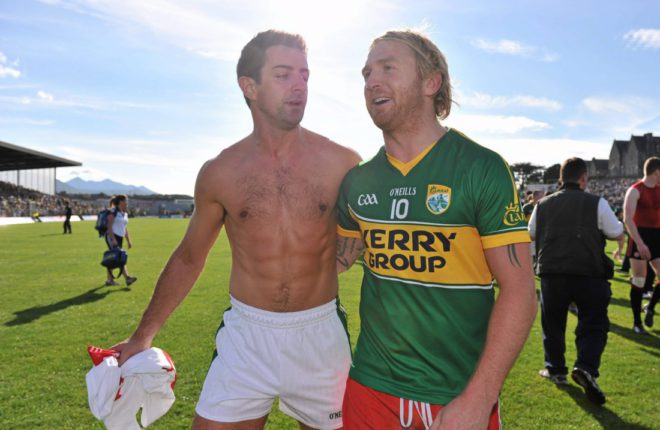
AT LAST…Aidan pictured with Owen Mulligan after Kerry’s 2012 win over Tyrone in Killarney
“They’d some amazing players, some brilliant forwards… a lot of people forget about that,” O’Mahony stresses.
“You talk about intensity and what teams bring, that team was exceptionally good from one to 15 and even the players they’d bring on.”
Over the course of an hour, O’Mahony chats freely across a range of topics and is enthused by the changes in the game.
Ulster teams made everyone else think outside the box and the nuance fly goalkeepers have brought.
But at the core, defenders need to defend. O’Mahony is from the school where pride comes from snuffing someone out.
Stephen O’Neill scored 5-46 on the way to the 2005 All-Ireland final. When Jack O’Connor’s number flashed up on O’Mahony’s phone, the Kerry manager informed him of his marking brief on O’Neill for the upcoming decider.
“It is a massive honour to get that type of opportunity and that faith is put in you,” O’Mahony proudly states.
“It is a huge opportunity to lay down a marker for yourself personally and for the team. That adds pressure; you are going out to a job and knowing that if I can carry out my job to nine out of ten, you are going a long way of winning the All-Ireland.”
Tyrone won the All-Ireland, but O’Mahony held his own though as O’Neill registered a single point from play. O’Mahony jokes of Peter Canavan’s two ‘big plays’.
First, he took a pass from Owen Mulligan before cushioning the perfect finish for Tyrone’s goal. There was his injury time drag down on Colm Cooper as Kerry went in search of an equalising goal.
“Kerry were saying back then, you couldn’t do that,” O’Mahony said. “There was so much made of when Monaghan played Tyrone and Sean Cavanagh pulled down (Conor) McManus.”
He also refers to Dublin impact sub Kevin McManamon’s winning goal against Kerry in the 2011 final.
“Looking back, if one of the (Kerry) players had pulled him down, we could’ve won an All-Ireland final.”
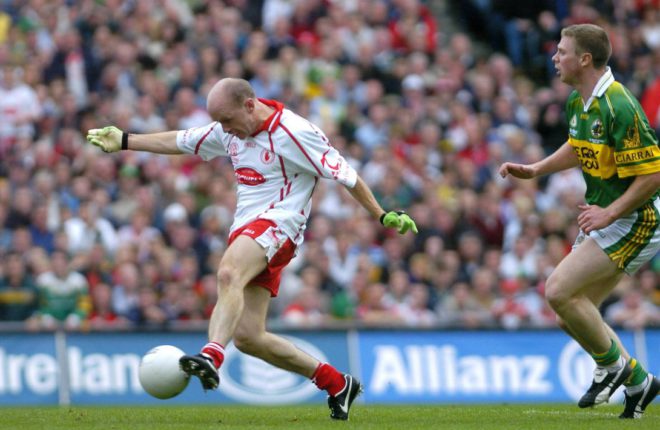
PERFECT FINISH…Peter Canavan slots home Tyrone’s goal in the 2005 All-Ireland final
O’Mahony has recently been coaching the MTU Kerry Sigerson team and has been involved with Kerry minor teams.
He doesn’t come out and say it, but you get a ‘student of the game’ sense from him. He uses the words system and setup with ease, contrasting the difference between dedicated sweepers and centre backs who sit deep.
If Canavan came alive to steer Tyrone in 2005, O’Mahony pins that title on Sean Cavanagh three years later and how he scored three second-half points off him. As a defender, he notes how Davy Harte and Philip Jordan were able to launch Tyrone’s attacks from behind midfield.
“When you cross the white line, it’s you and your man… anything can happen,” he continues.
Chat shifts to the Jim McGuinness blueprint for Donegal. After building the foundation of an ultra-defensive shape in 2011, they added a counter-attacking dimension 12 months later.
O’Mahony has an appreciation of it and the diligence it demanded.
“Everyone was giving out about how they were playing, but they played it effectively, they went with the system that suited the players they had,” O’Mahony said, giving the picture of a core of players at peak fitness, frustrating teams and hitting them on the break.
Donegal were now stepping out of Tyrone’s shadow as Ulster’s new force.
Earlier in the 2012 season, he remembers being hung out at a blustery Ballyshannon in the league. It was one of those afternoons when you garner the hurt, letting it stew away inside and tap into it to find an edge.
The entire half of the field was O’Mahony’s enemy in his duel with Murphy. An acre of space is never a defender’s friend, especially with McGuinness barking the ‘leave the ball in early’ mantra from the sideline. His fourth Celtic Cross in 2009 was as far away as ever.
By the time the 2013 season petered out with a seven-point defeat at the hands of the Dub in a semi-final 3-18 to 3-11 shootout, the whispers began to suggest Kerry’s goose was cooked.
Playing for Kerry brings expectation and pressure in equal measure. A noise from outside the camp that never subsides. Transition doesn’t wash in Kerry. Sam Maguire on the sideboard is the only currency.
“You look at Dublin now, they are in the same position and there is expectancy straight away,” O’Mahony states.
“All the top soccer teams, there is an expectancy to stay at the top at all times, no matter who you are or whoever pulls on that jersey.
“It’s a thing down here that when you come in there is always a pressure on you, there is pressure on you to perform anytime you put on that Kerry jersey.”
It’s the same on the club scene where county players can be taken down a peg or two. An upstart on the panel wanting to impress will use the county star as the indicator. The same comes for someone on the outside doing anything to get noticed.
“The Kerry golden years were so successful that the mind-set is there with the people and that’s a great thing as a player,” O’Mahony points out.
“It makes you very determined and as a person it makes you very driven that every time you go out there you want to win.”
The promise of hoisting Sam Maguire in his father’s memory was every bit as strong at the start of the 2014 season.
A four-point win over a Clare team that needed a replay to see off Waterford was followed up by a double scores win over Cork in the Munster final.
James O’Donoghue’s 1-5 from play downed Galway in the All-Ireland quarter-final, setting up a last four clash with Mayo that would define their season.
Enter Kieran Donaghy; someone O’Mahony had many a battle with in training. Mayo were four points ahead with three minutes of normal time. David Moran’s outside of the boot kick from the sideline hovered over the head of Donaghy who plucked it and quickly offloaded to O’Donoghue who hit the net. Kieran O’Leary levelled matters and Kerry won the replay.
“He (Donaghy) is one of those players, even to the last minute; he is never out of the game. One ball and he’ll turn a game, that’s his mind-set,” O’Mahony explains.
As they prepared for Michael Murphy and Donegal in the final, the ball winning ability of Donaghy was the perfect training partner. O’Mahony would always tell his two corner-backs to focus on their own men.
“You’d have a corner-back looking up at him and he’d have the ball slipped off to the forward. He was always very good.”
That one such split second movement saved Kerry and the race for Sam was still on.
O’Mahony admits to dropping too deep and inviting Mayo onto them in the drawn game. He was replaced and Marc Ó Sé was dropped for the replay, with Killian Young coming in and Paul Murphy reverting to the corner.
With 22 minutes gone in the replay, Ó Sé replaced Shane Enright and had a stormer. O’Mahony and Peter Crowley, who picked up Aidan O’Shea, were also excellent.
“I’d say it was the first game he (Marc Ó Sé) was dropped for,” O’Mahony recalls. Kerry defenders were looking over their shoulders with the biggest game of the season upon them.
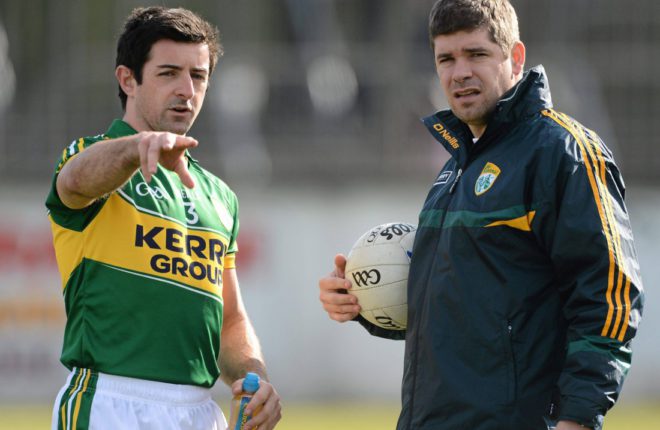
GAFFER…Éamonn Fitzmaurice’s assigned Aidan to pick up Michael Murphy in the 2014 All-Ireland final
Fitzmaurice went for O’Mahony on Murphy, the man his father was raving about two years earlier. It was written in the stars, but first it was time to get to work.
“It is horses for courses,” O’Mahony said of their marking arrangements. “I had a chat with Éamonn and spent three weeks inside (at training) with (Kieran) Donaghy… no better man to prepare you for the aerial ball or any ball because he is so good once he is inside there. He was one of those players that come out (the field) too, so he was a carbon copy of Murphy.
“Outside of a GAA pitch, he (Murphy) is a fantastic guy and the respect you have for him. For me, it was a huge game and I knew that if I could make some hold of him, it would go a long way in winning the game.”
Murphy thumped over a point from distance, his only from play, and was involved in the move that led to McFadden’s last-gasp scramble to try for a game-saving goal.
“I always say to people, you never go out and mark someone like Michael Murphy out of the game, you try and keep him as quiet in open play as you can,” added O’Mahony.
At the other end of the field, they had a slice of luck when Paul Durcan’s kick-out was caught in Kerry’s trap of tempting the ‘keeper into false space and Donaghy slotted home the easiest of winning goals.
But there was no fortune in their first goal, from a high ball on top of Paul Geaney, a rehearsed training ground ploy that left Donegal chasing the game.
“Paul is very good over his head and Éamonn (Fitzmaurice) was a bit before his time,” O’Mahony states.
The management knew Neil McGee would pick up James O’Donoghue who Kerry used in a playmaking role. As expected, Eamon McGee went to Donaghy, who pulled the Gaoth Dobhair man far enough out to allow Geaney to use his height advantage over Paddy McGrath.
Boom. In came an early ball from Stephen O’Brien and Geaney took possession before slotting beyond Durcan. Advantage Kerry.
“We knew they’d have to come out to play and we’d get a point here and there,” O’Mahony said of another benefit of their ‘rehearsed’ goal.
He admits to getting the rub of the green in a season when they were told the production line was dwindling, they were too old and the county was in transition.
There was the famous Kieran Donaghy ‘what do you think about that’ jibe at Joe Brolly, after their 2014 minor and senior double.
“For myself, I won’t say it is pressure, but you have that outside noise and people are talking that you are 35.
“Using that negative noise to drive you on was something that I always did. My other side was that I trained so hard that I knew the body was in good shape. You are going out and you are fit as anyone else, so it is a case of getting a bit of luck on the day, getting into the game and getting a few breaks.”
The clock was ticking and O’Mahony knew the opportunities for glory were fading fast. He compares their 2014 win to Tyrone’s taking Sam north last year.
“They came down to Killarney and got an awful spanking, with people talking about them left, right and centre.
“All of a sudden you change your year and go on and win an All-Ireland… it was very satisfying for us in 2014.”
Kerry didn’t focus too much on Donegal. Instead, they generated the ‘manic hunger’ when it mattered. Night after night, panellists were ‘hammering’ into training games. By the time, the final came they were ready.
The extra game against Mayo did them no harm, to offset the difference in Kerry’s waltz through Munster to the dog-eat-dog nature of the Ulster Championship.
“When we played Tyrone or Donegal, by the time they got to an All-Ireland, they were battled hardened with so many tough games,” O’Mahony feels.
“That’s the beauty of it all. When you come out of Ulster, you know you’ve been tested in every way possible and you are coming into an All-Ireland semi-final where a team hasn’t had the same test.”
It was Kerry’s last season as champions and within three years O’Mahony was retired. Had a full-time sweeper been in vogue back then, he jokes of how he may have squeezed another five years out of his inter-county career.
He has been impressed with the current crop, with Paddy Tally on Jack O’Connor’s ticket, sitting top of the table with the perfect mix of defensive meanness that has only shipped a Conor McManus penalty in six league outings. They are making full use of the sheer brilliance of David Clifford.
From his own playing days in defence, O’Mahony raves about how Bernard Brogan never came outside the 20-metre line. The danger zone was his playground.
“To play in there, number one, you have to be very selfish but, number two, your workrate needs to be through the charts.
“The tightest corner-backs were right up behind him but he was well able to win the ball. He knew where he was, that’s what (Kieran) Donaghy would bring as well.
“That’s what Armagh are bringing now, with Rian O’Neill and these boys, they know their positions. They know what their kicking ability is and they are getting that ball in there.”
To play in Croke Park in the biggest occasion, there must be a variation between a kicking game and running the ball in the channels.
“It’s a kicking pitch,” O’Mahony states. “It’s the size of it and it’s the sod as well. If you look at Kilcoo, they were very fortunate that they had great running players and they needed that bit of luck to win an All-Ireland as well.
“If you look at Tyrone’s game plan, the way they changed from the league to the All-Ireland final, they brought a bit of everything.
“You look at the last couple of years, any team that has won the All-Ireland has been a kicking team. Tyrone last year, Dublin before that. The running game will take you so far, but when you get into the spaces in Croke Park, I think you need a mixture of both, especially at inter-county level.”
For O’Mahony, the static blanket defence is an artefact and Mayo have perfected the new-look style of matching an opponent’s method of minding the house and hitting on the break.
“Mayo are very good with their transition and their kicking is unreal. Their full-back and half-back lines are as good as what are in the game,” O’Mahony said.
He sees the game going down the route of versatility and having players comfortable kicking and carrying the ball in equal measure.
“The only thing I don’t like is the lateral hand-passing inside, teams are afraid to lose the ball and it is keeping possession at all costs.”
After losing five games in a row, including last year’s All-Ireland semi-final to Mayo, Dublin head to Clones this weekend in search of a third victory to ease their relegation fears.
At the time of our conversation, Dublin hadn’t won a single game, but Aidan O’Mahony wasn’t buying into their demise of any chatter about transition. He chose to take a different view on what will be the most open race for Sam Maguire in many years.
For Dublin, it was all about getting the sights on an improving Kildare team in Leinster with a potential All-Ireland semi-final clash with the Kingdom.
“I’d be worried then because they need to play one big game,” he said.
“Of all the games, even the Kerry game down in Tralee, take out the two goal chances they had and they were not that far away.
“For Kerry, the positives are that they have unearthed Dan O’Donoghue, their backs seem to be better. Whatever they are doing at training, they are not leaving the centre open.
“Tadhg Morley always seems to be dropping from the centre which means that Adrian Spillane is sitting more into the pocket in front of the number six.
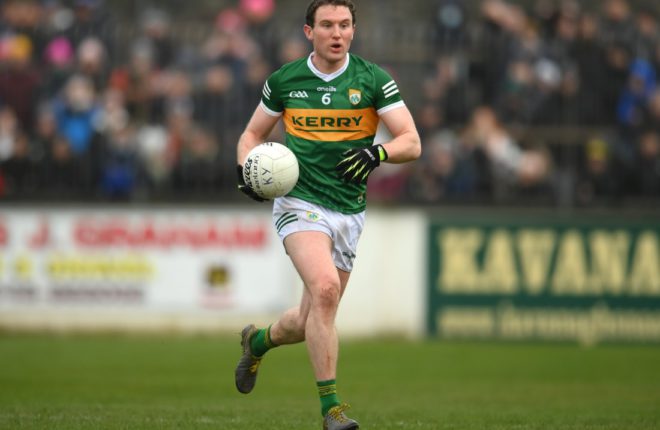
IN THE POCKET…Aidan O’Mahony is impressed with Kerry have defended this season, with Tadhg Morley holding the centre
“They are collectively defending better. Then you have David Clifford and Seanie O’Shea, they are just two players, for a relatively young age, they are huge players for Kerry. You need to keep them fit at all times.”
Mayo always come into the conversation. Tommy Conroy may be gone for the year, but a return of Cillian O’Connor gives them another dimension.
“They are not that far away from winning an All-Ireland and I know we are saying that every year,” O’Mahony outlines.
He feels that Kevin McLoughlin and Aidan O’Shea coming off the bench could add something different. Jason Doherty is another name that rolls off his tongue.
“Aidan O’Shea’s most effective position, in my opinion, is on the edge of the square and any time I see him in there, they don’t seem to be kicking the ball into him.
“I think they have learned that now and he is coming in now in games, where he has to primarily win ball in the middle of the field.”
“You are throwing more teams in there, you’ve Tyrone, and you’ve Armagh and you’ve Derry, I don’t think anyone will fancy meeting them in the championship either,” he said, speaking before Rory Gallagher’s side ended their unbeaten league run at home to Galway.
O’Mahony has tipped Donegal in the past, but feels a more direct gameplan to Murphy, McBrearty and Langan would pay greater dividends, like Armagh and like the Dublin of old.
Kerry’s unbeaten run is one thing, but it will count for little and their win over Dublin in Tralee will only add fuel to the fire if Dessie Farrell can get a tune out of them in Leinster.
“Like (Kerry) in 2014, any time you get knocked, you have a point to prove, not to anyone outside the group, but to yourself.
“The likes of James McCarthy and Con O’Callaghan coming back in, any team they come into are going to be strengthened.”
With the Ulster teams getting a battled hardened level of preparation and O’Mahony’s endorsement of using the fast sod of Croke Park to let the ball in, he uses Tyrone’s 2021 versatility as the perfect example of how a team can grow.
“They have brilliant kickers and they seem to be using them. You have the likes of Peter Harte. You have somebody like (Cathal) McShane, he hadn’t played much football and he got that goal,” he said of his goal in last year’s final, tipping Conor Meyler’s probing diagonal ball to the net.
There is also the long kick-out and a ‘train of runners’ leading to Darren McCurry’s goal.
Regardless of sweepers or mass defences, O’Mahony stresses anyone playing in the full-back line must be capable of marking man on man.
“I think of the McGees, especially Neil, he was blessed with pace and was an exceptional defender, the same with Eamon.
“We used to always say about Dublin, the likes of Bernard Brogan, you’d always try to man-mark them.
“In the half-back line, you’re fine, because your man will maybe be dropping back and you either hold back or follow up.”
Playing closer to goal is totally different. It’s about any sweeper sitting tight with an eye for where danger is coming from and knowing when to push out and when to drop.
“I did it myself one year against Dublin and my own mind-set was that you sit in the D,” O’Mahony said of the area where goal chance or danger will pass through.
“When the ball is coming down the left side, you are pushing out to the left so you are in their eye line and if you are pushing out to the right then you are in their eye line.
“They have to work the ball up the field a 100 metres, so if are a sweeper sitting there, you are cutting off the danger of the long.”
He commends Armagh, under the influence of Kieran Donaghy’s coaching eye, for moving the ball early before Dublin had a chance to filter anyone back in their win at Croke Park this season.
“I found that myself in 2014 with Michael Murphy, we didn’t have a sweeper, we just kept our half-back line in positions, because we knew their half forward line were going to drop deep,” he said.
And when Donegal’s attackers came back in play, Kerry’s half backs tuned in as their opponents crossed the 65.
“I think it was myself and Marc Ó Sé, McFadden and Murphy,” he said of the arrangement for much of the game.
This weekend, Kerry welcome Tyrone to Killarney and they’ve former Red Hands’ coach Paddy Tally on board, helping knit their swashbuckling attacking game to a system that never leaves their middle open.
“Here is a guy who has seen that and done that, he is no different to Éamonn bringing in Cian O’Neill for the conditioning and he brought us up to a new level altogether,” O’Mahony said.
“He has the credentials and everybody speaks highly of him. In the league so far, it is showing that his coaching is definitely working on the backs.”
Will Tally be the Ulster man, at the heart of title number 38 returning to Kerry? Maybe.
“You can talk about systems and coaches, but at the end of the day, down here in Kerry, people will demand that we win an All-Ireland, so July will be the bearing on all of that,” O’Mahony concludes.
Having won five All-Ireland finals and lost four, he knows the story all too well.
Receive quality journalism wherever you are, on any device. Keep up to date from the comfort of your own home with a digital subscription.
Any time | Any place | Anywhere




